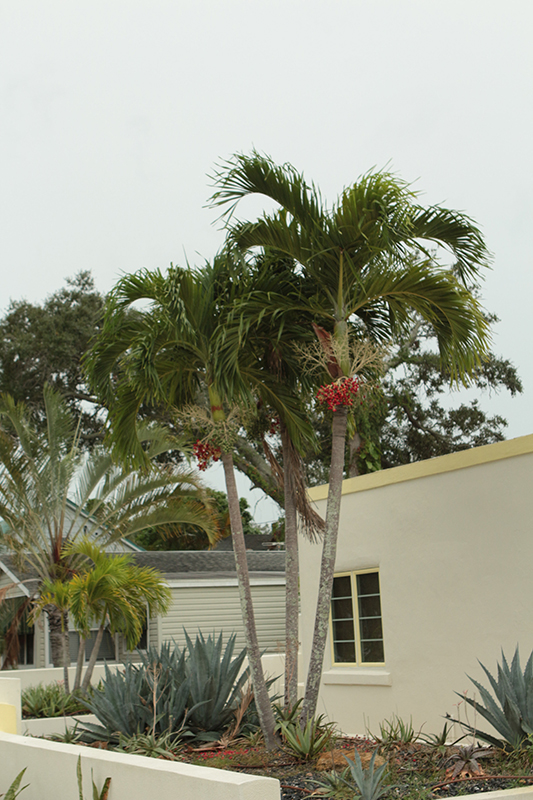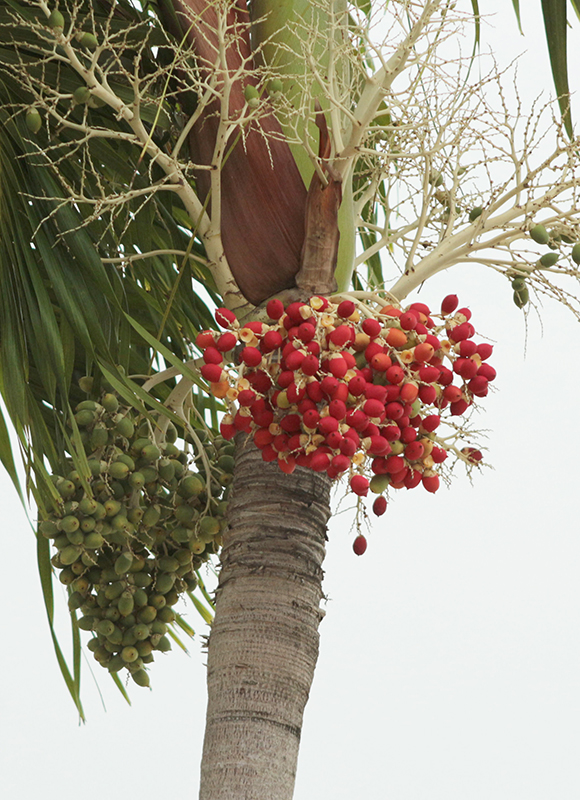Height: 20 feet
Spread: 10 feet
Sunlight:
![]()
![]()
Hardiness Zone: 10a
Other Names: syn. Veitchia Merrillii, Christmas Palm
Description:
This variety is used as an ornamental plant in warm temperate regions; trim away dead foliage to enhance appearance; will slowly mature into a stately palm and make an excellent landscape focal point
Ornamental Features
Manila Palm is primarily grown for its highly ornamental fruit. The fruits are showy red drupes carried in abundance from mid fall to mid winter. It has attractive green deciduous foliage. The narrow pinnately compound leaves are highly ornamental but do not develop any appreciable fall color. It has panicles of creamy white star-shaped flowers hanging below the branches in late summer. The smooth gray bark is extremely showy and adds significant winter interest.
Landscape Attributes
Manila Palm is a deciduous tree with a strong central leader and a towering form, with a high canopy of foliage concentrated at the top of the plant. Its relatively fine texture sets it apart from other landscape plants with less refined foliage.
This tree will require occasional maintenance and upkeep, and should not require much pruning, except when necessary, such as to remove dieback. It is a good choice for attracting bees to your yard. Gardeners should be aware of the following characteristic(s) that may warrant special consideration;
- Disease
- Self-Seeding
Manila Palm is recommended for the following landscape applications;
- Accent
- Vertical Accent
- Windbreaks and Shelterbelts
- Container Planting
Planting & Growing
Manila Palm will grow to be about 20 feet tall at maturity, with a spread of 10 feet. It has a high canopy with a typical clearance of 6 feet from the ground, and is suitable for planting under power lines. As it matures, the lower branches of this tree can be strategically removed to create a high enough canopy to support unobstructed human traffic underneath. It grows at a slow rate, and under ideal conditions can be expected to live for 60 years or more.
This tree does best in full sun to partial shade. It does best in average to evenly moist conditions, but will not tolerate standing water. It is not particular as to soil type or pH. It is somewhat tolerant of urban pollution. This species is not originally from North America.
Manila Palm is a fine choice for the yard, but it is also a good selection for planting in outdoor pots and containers. Because of its height, it is often used as a 'thriller' in the 'spiller-thriller-filler' container combination; plant it near the center of the pot, surrounded by smaller plants and those that spill over the edges. It is even sizeable enough that it can be grown alone in a suitable container. Note that when grown in a container, it may not perform exactly as indicated on the tag - this is to be expected. Also note that when growing plants in outdoor containers and baskets, they may require more frequent waterings than they would in the yard or garden. Be aware that in our climate, this plant may be too tender to survive the winter if left outdoors in a container. Contact our experts for more information on how to protect it over the winter months.
A NetPS Plant Finder tool



